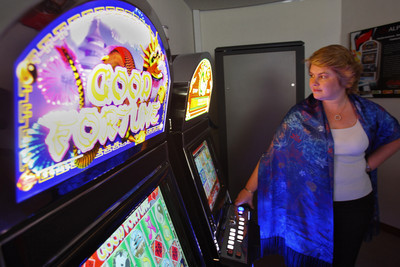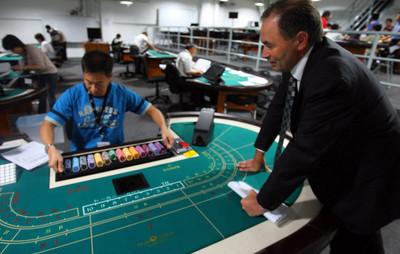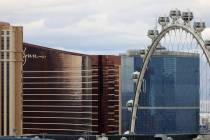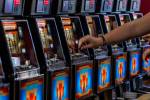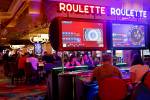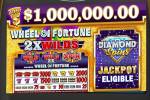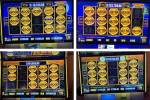TURNING THE TABLES
Editor's note: Review-Journal gaming reporter Howard Stutz and director of photography Jeff Scheid traveled to Macau to see how some of Nevada's largest gaming companies have helped the Chinese enclave pass the Strip in annual gaming revenues.
MACAU -- The image of gambling here is etched in history.
Before Gaming Inc. arrived from Nevada, Macau's aging casinos, operated by Hong Kong gambling pioneer Stanley Ho, entertained a predominately male clientele who crowded baccarat tables located in dark rooms with low ceilings and a grungy atmosphere.
It's a scene still played out today in the older casinos.
Chinese gamblers, smoking cigarettes and drinking tea, "squeeze" their cards before deciding how much to wager. When a table is "hot," spectators often line up three or four deep to watch the action, yelling encouragement to the players. When the hand goes the house's way, players often slam their cards on the table in disgust while others loudly express disappointment.
Gambling is not entertainment in Macau; it's business.
The spacious casinos opened in the past three years by Las Vegas Sands Corp. and Wynn Resorts Ltd. have overshadowed the old gambling joints. The Sands Macau, Wynn Macau and Venetian Macau are neither dark nor overly smoky. In fact, the newer resorts offer nonsmoking gaming areas. Asian women are as active at the tables as their male counterparts.
The new casinos have also brought another Las Vegas element to Macau: slot machines with video and ticket in-ticket out technology.
Where baccarat was and remains king, slot machines are taking hold in the market.
In 2002, there were 808 slot machines in Macau, mostly coin operated, spinning reel games built by companies no longer in existence. Some of those games can still be found in the back corners of the old Lisboa.
By the end of this year, when the MGM Grand Macau opens, the market will have 12,334 slot machines, 15 times the number of games six years ago. By 2010, gaming analysts predict, Macau will house 31,156 slot machines. The Nevada Gaming Control Board said there were 49,246 slot machines on the Strip at the end of August.
When the $2.4 billion Venetian Macau opened Aug. 28, the 546,000-square-foot casino was equipped with some 3,400 slot machines, almost as many as there were in all of Macau in 2005.
Still, VIP table game play -- high-end baccarat gamblers -- accounted for roughly 70 percent of Macau's $6.7 billion in gaming revenues in 2006.
The growth of slot machines in Macau had American operators rushing across the Pacific to set up shop.
"I think this market is destined for very big things," said Cath Burns, an Australian native who is managing director of the Macau office for Bally Technologies. "To me, people will play slots anywhere in the world as long as the product is good, they are having fun, making a bit of money and enjoying the experience. There is no difference between Chinese slot players, American slot players or Australian slot players."
Most of the major slot machine makers are represented in Macau. Australian-based Aristocrat Technologies, because of its close proximity to Southeast Asia, got an initial foot in the door when the market expanded in 2004. StarGames, another Australian slot maker that was purchased by Shuffle Master almost two years ago, also has a presence in Macau. However, Bally and Reno-based International Game Technology have since established offices.
American casino operators were quick to embrace slot machines in a market that was primarily table game driven. The Sands Macau opened in 2004 with 666 slot machines and now has a little more than 1,100 following an expansion to its gaming area.
Dennis Andreaci, vice president of table games for the Sands Macau and Venetian Macau, said slot machine customers were always there for the picking in Macau, but casinos would fill the spaces with table games because they were so much more profitable.
"There has always been this big misconception that Asians don't like to play slots," Andreaci said. "That's not always the case. I've opened eight properties in Asia. I've always had slots and they have always done fine. The problem in Asia is that slot machines take the space that baccarat requires; one baccarat table versus 10 slot machines. The baccarat table makes so much more money."
At the Wynn Macau, casino executives didn't hesitate to put in 365 new slot machines when the casino opened in September 2006. Wynn added 200 machines recently, and 545 machines will join the mix in January.
Wynn Executive Vice President of Operations Jay Dee Clayton said the company believed Asian customers would quickly embrace slot machine technology, such as cashless gaming and secondary bonus features.
"I spent some time in Australia and I saw how adaptive people were to technology there," Clayton said. "You will also find that same acceptance of technology in Asia. It's much greater than in the U.S."
Clayton said there was just a small learning curve for slot machine players to accept ticket in-ticket out slots.
"Once they get it, they love the convenience of not schlepping around buckets full of money," Clayton said.
Gaming consultant Jonathan Galaviz, of Las Vegas-based Globalysis, said slot makers are concerned with guarding their intellectual property in Asia, where the copyright laws are different from the U.S.
"They want to ensure there won't be a stealing of ideas," Galaviz said. "They want to know there is some level of protection. Still, over the next five to 10 years, we're going to see a transformation of consumer acceptance toward slot machines in Asia."
John Gomes, who oversees IGT's Macau office, said each casino operator is finding what works in balancing table games with slot offerings.
"Every company exercises their own strategy on how they see fit to maximize revenues," Gomes said. "Although this market has a strong following for casino table games, we do believe that as the market matures the acceptance of electronic machines and table games will increase due to popularity and labor costs."
American slot makers have to first figure out what games and titles work in Macau.
Wheel of Fortune, a staple in every Las Vegas casino, is conspicuously absent in Macau because it is based on an American-themed television program. The number four is also not used. When spoken in Chinese, four sounds like the word for death.
"Some American themes don't translate well," Burns said. "It was a matter of being culturally sensitive and doing some investigation. We know there are certain icons and colors that work."
In China, red is considered a lucky color. IGT has a game where the cabinet is red.
Slot machines in Macau carry themes that are meaningful to Asian gamblers. Chinese symbols of good luck are prominent, such as dragons and gold coins. IGT offers slot machines with famous Chinese character symbols, including pandas, lotus flowers and the performers doing the lion dance.
Bally's popular Blazing 7s game that is played throughout American casinos is also popular in China. Burns said the game is being retooled to become Blazing 8s for the opening of the MGM Grand Macau later this year. Eight is considered the luckiest number in Chinese culture.
"I'm cautious about reading too much into a game," Burns said. "There's a lot we're trying."
Gomes said video poker, one of IGT's largest products in Las Vegas, hasn't caught hold in Macau.
"There are some poker machines currently place in some of the properties in Macau," Gomes said. "Although poker does not play a big percentage of the slots mix, I do believe that as the market matures poker machines will become part of the product mix in every property in the future."
Contact reporter Howard Stutz at hstutz@reviewjournal.com or (702) 477-3871.
MacauLas Vegas, Half a World AwayIn Depth Package
THE SERIES Sunday: Macau is in the cross hairs of a multibillion-dollar building boom largely fueled by Nevada's major gaming companies, which are exporting Las Vegas-style casinos into a market starving for action. Monday: Thanks to the growing casino industry, unemployment is just 3 percent in Macau. But where will all the workers come from to staff the new casinos now under construction? Today: More than 80 percent of the table games in Macau are dedicated to the game of choice for Asian gamblers: baccarat. But the use of slot machines is growing, and Nevada's slot makers are trying to capitalize on the market. Wednesday: Macau's Cotai Strip has more than 20,000 hotel rooms in various stages of construction. By 2010, the Cotai Strip will resemble the heart of the Strip in Las Vegas. Thursday: American gaming giants Las Vegas Sands Corp., Wynn Resorts Ltd. and MGM Mirage are establishing footholds in Macau. But an Australian company, in partnership with the son of Macau's casino pioneer, is ready to challenge the experienced casino operators. BRINGING MORE TO THE TABLE IN MACAU MACAU -- New table games are slowly finding an audience in Macau's casinos. Baccarat is still the main draw, but Asian-themed card and dice games, such as Sic Bo, Fan Tan and Yee Hah Hi, have gathered a following. Casino stalwarts blackjack, roulette and craps are also being used. Las Vegas-based Shuffle Master has been able to place a small number of Casino War table games into the Macau market. The company recently bought the rights to Caribbean Stud Poker, which has between 175 and 200 tables in Macau. The company's other popular titles, Three Card Poker and Let It Ride, have yet to gain a footing. Poker is still nonexistent. Janice Leung, the regional sales manager in Asia for Shuffle Master subsidiary StarGames, said new table games need to meet a number of criteria in order to be successful. They need to be simple to understand, be perceived as being fair and carry odds giving the house and player an equal chance to win. "With the casino growth, we're starting to see interest from the players in a much wider variety of table games," Leung said while walking through the casino at Wynn Macau. "Players are willing to try different games. Even at the older casinos, like the Lisboa, we're able to bring in different games." Leung said Macau's Gaming and Inspection Bureau requires that casinos, not the manufacturers, file the paperwork to bring a new game to the market. She added that Shuffle Master's and StarGames multi-player electronic table games are also starting to gain traction. "The market is changing, which bodes well for some these new products," Leung said. The growth of gaming tables has also been a source of revenue for products from Shuffle Masters' casino equipment division, including automated card shufflers. HOWARD STUTZ/REVIEW-JOURNAL



